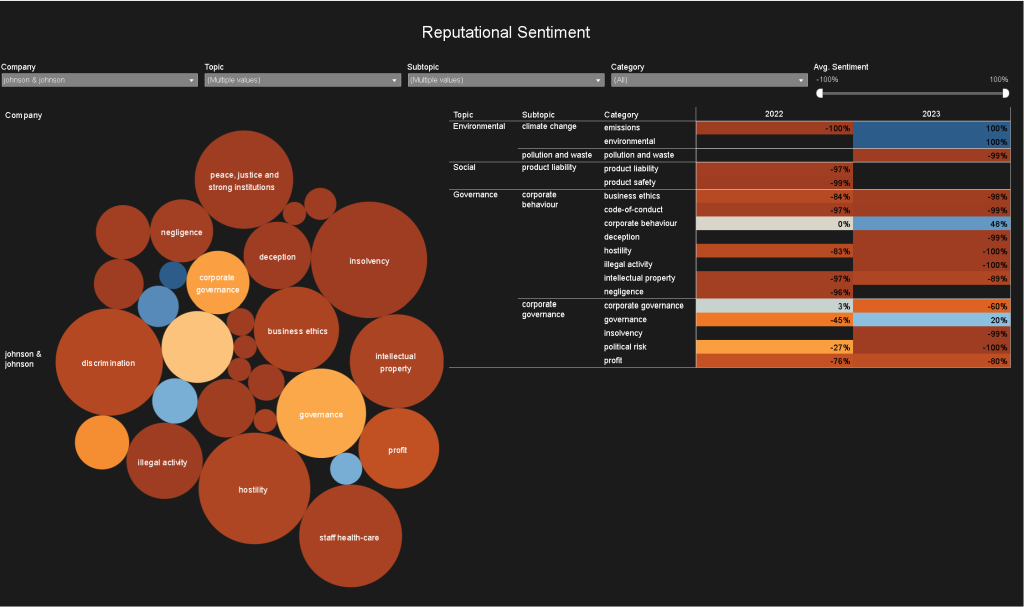Johnson & Johnson, a renowned multinational corporation, has long been recognized as a leader in the healthcare industry but how do they rank in terms of ESG activity? We take a closer look at the Johnson & Johnson ESG score in this article….
The Importance of ESG Scores
ESG refers to the three key factors that measure the sustainability and societal impact of a company. Environmental factors assess a company’s impact on the planet, social factors evaluate its relationship with its employees, customers, and communities, and governance factors examine the company’s internal policies and practices. These factors are crucial in assessing the long-term viability and ethical standing of a company.
ESG is important because it helps investors, stakeholders, and society at large assess the overall sustainability and corporate responsibility of a company. By considering the environmental and social impact of a company’s operations, investors can make informed decisions that align with their values. Additionally, companies with robust ESG practices tend to attract and retain top talent, enhance their reputation, and mitigate potential risks.
Johnson & Johnson ESG Score Overview
Despite being a leader in the healthcare industry, Johnson & Johnson’s ESG performance has been consistently rated poorly, raising concerns among investors, consumers, and environmental advocates.
According to our data at time of writing, Johnson & Johnson has an environmental score of 42, a social score of 33 and a governance score of 5. This is startlingly low across the board. But what are the reasons for this poor Johnson & Johnson ESG score?

Environmental Concerns
J&J’s environmental footprint has been a major source of criticism. The company has been accused of using hazardous chemicals in its products, contributing significantly to greenhouse gas emissions. Beyond this, the company has faced criticism for engaging in unsustainable waste disposal practices, adding to the environmental concerns surrounding its business practices. The cumulative effect of these issues has intensified the public discourse around J&J’s environmental responsibilities and the need for the company to address and rectify its environmental impact.
Social Issues
Johnson & Johnson’s involvement in the opioid crisis has cast a dark shadow over its reputation. The company has been accused of misleading consumers about the risks of its opioid painkillers, contributing to the widespread addiction and overdose crisis that has plagued the United States. Additionally, their labour practices and record on racial and gender diversity have drawn criticism, with allegations of unfair labour practices and a lack of diversity in its workforce.
Governance Shortcomings
J&J’s corporate governance practices have also come under scrutiny. The company’s opaque decision-making processes and lack of accountability have raised concerns among stakeholders. Additionally, J&J’s political spending and lobbying activities have been criticized for influencing policy decisions and prioritizing profits over social and environmental responsibility.

Johnson & Johnson ESG Score: Steps Towards Improvement
In response to mounting criticism, J&J has taken steps to improve its ESG performance. In 2020, the company announced a new ESG strategy, outlining goals for reducing greenhouse gas emissions, increasing renewable energy usage, and enhancing labour practices. However, the effectiveness of these initiatives remains to be seen, and J&J’s overall ESG performance continues to lag behind industry standards.
Comparing the Johnson & Johnson ESG Score to Competitors
The Johnson & Johnson’s ESG score is generally lower than those of its competitors. This suggests that the company is lagging behind its peers in terms of its environmental, social, and governance performance.
Here is a more detailed breakdown of how Johnson & Johnson’s competitors fare by comparison with regards to their ESG ratings:
Environmental: Johnson & Johnson’s competitors have generally made more progress in reducing their greenhouse gas emissions and increasing their use of renewable energy. For example, Abbott Laboratories has pledged to become carbon neutral by 2030, and Bristol-Myers Squibb has set a goal of reducing its emissions by 50% by 2030.
Social: Johnson & Johnson’s competitors have generally stronger records on labor practices and diversity. For example, Pfizer has been recognized for its diversity initiatives, and Merck & Co. has been praised for its commitment to employee safety.
Governance: Johnson & Johnson’s competitors have generally more transparent corporate governance practices. For example, Abbott Laboratories has a strong whistleblower protection policy, and Bristol-Myers Squibb has a board of directors that is majority-independent.
Overall, Johnson & Johnson’s ESG performance is lagging behind that of its competitors. The company needs to take more aggressive action to address its environmental footprint, social issues, and governance shortcomings if it wants to improve its ESG standing and attract socially conscious investors.
Johnson & Johnson ESG Score: Future Prospects
To regain competitive ESG standing, J&J must undertake more aggressive measures to address environmental concerns, rectify social issues, and enhance governance practices. The company’s ability to attract socially conscious investors and align with evolving sustainability expectations will depend on its commitment to tangible improvements across these critical dimensions. The road ahead for J&J involves navigating through these challenges, implementing robust reforms, and demonstrating a genuine dedication to sustainable and responsible business practices. The company’s future hinges on its capacity to evolve and embrace a transformative approach that resonates with the growing emphasis on ESG considerations in the global business landscape.
Take a Deeper Dive into Johnson & Johnson’s ESG Data
For those seeking a more in-depth understanding of Johnson & Johnson’s ESG performance and wanting to access granular data, we invite you to get in touch to request more data. Our comprehensive analysis delves into the intricate details of J&J’s ESG standing, providing nuanced insights that go beyond the surface.
